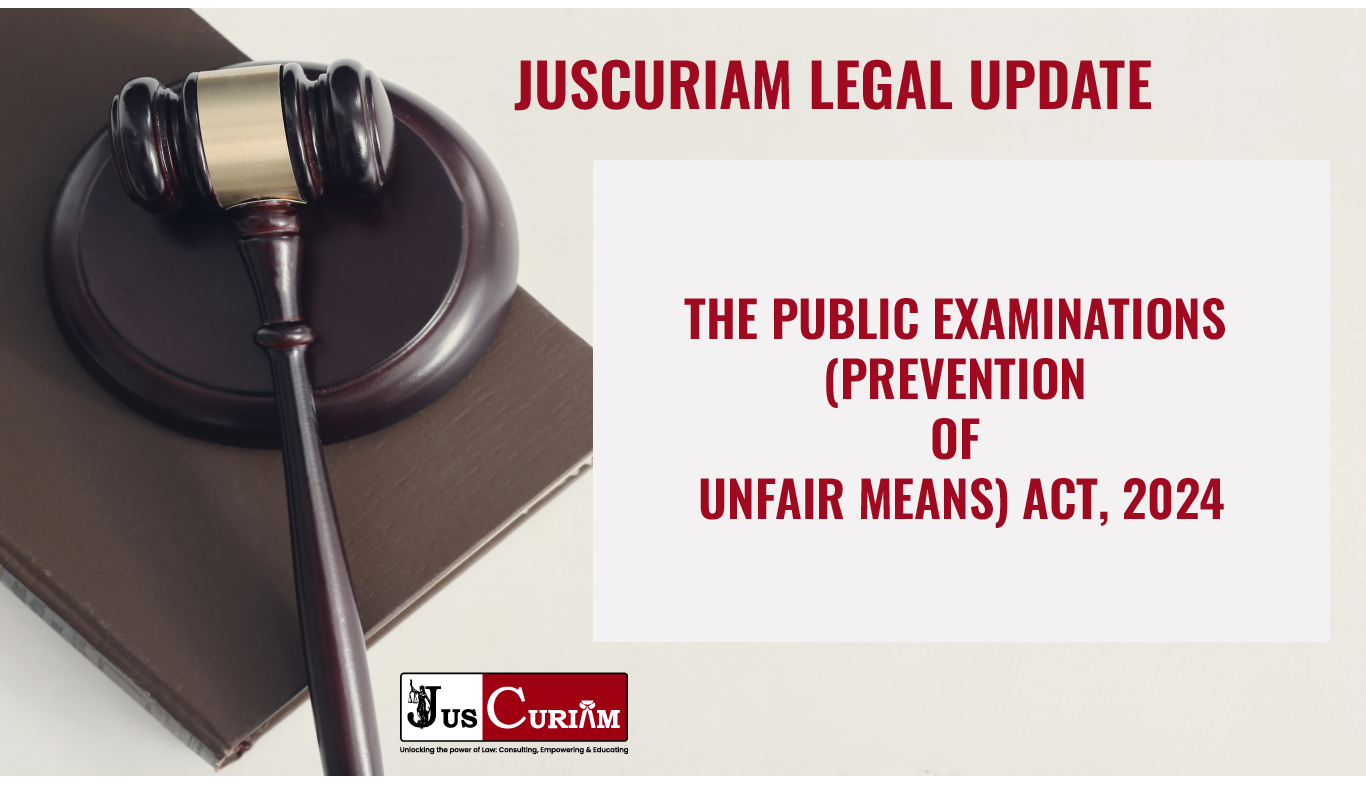The Centre on 24th June 2024 notified the Rules required to operationalise The Public Examinations (Prevention of Unfair Means) Act, 2024, the anti-cheating law which was passed by Parliament in February, came into force on June, after notified in the official gazette.
This Act has been introduced in Lok Sabha, aiming to prevent “Unfair Means” in order to “bring greater transparency, fairness and credibility to the Public Examinations System.
The Objective of this ACT:-
- In the recent years there have been a very large number of cases of question paper leaks in recruitment exams across the country. In which the process of hiring for government jobs was disrupted.
- Malpractices in public examinations lead to delays and cancellation of examinations, which leave a negative impact between the millions of youth.
- At present, there is no specific substantive law to deal with unfair means adopted or offenses committed.
- Identifying the problem and providing an effective solution for the examination system.
- The objective of the Bill is to bring greater transparency, fairness and credibility to the public examination systems and to secure the future of the youth.
Key Provisions of the Act:-
Defines Public Examination:
- Under Section 2(k), a Public Examination is defined as any examination conducted by a “public examination authority” listed in the Schedule of the Bill, or any such other authority as may be notified by the Central Government.
- The schedule lists five public examination authorities, Union Public Service Commission (UPSC), the Staff Selection Commission (SSC), the Railway Recruitment Boards (RRBs), the Institute of Banking Personnel Selection (IBPS), the National Testing Agency (NTA).
- NTA conducts the JEE (Main), NEET-UG, UGC-NET, the Common University Entrance Test (CUET)
- Apart from all these above public examination authorities, all “Ministries or Departments of the Central Government and the subordinate offices for recruitment of staff” will also come under the purview of the new law.
- The central government can add new authorities in the schedule through a notification as and when it required.
Punishments:
- According to section 9 of the Bill states that all offences shall be cognizable, non-bailable, and non-compoundable.
- The police has an authority to investigate the case without seeking permission from the Magistrate as a cognizable offence.
- As a non-compoundable offence any the case filed under this ACT cannot be withdrawn by the complainant even though there is a compromise between the complainant and the accused, and a trial must necessarily follow.
- An arrest can be made without a warrant and bail will not be a matter of right; rather, a magistrate will determine whether the accused is fit to be released on bail.
- Punishment for “any person or persons resorting to unfair means and offences” can be three to five years in prison, and a fine up to Rs. 10 lakh.
- If the convict fails to pay the fine, “an additional punishment of imprisonment shall be imposed, as per the provisions of the Bharatiya Nyay Sanhita, 2023.
- A service provider who is engaged by the public examination authority for the conduct of examinations, shall also be liable to be punished with imposition of a fine up to Rs. 1 crore and proportionate cost of examination shall also be recovered from it, if the service provider is found to be guilty/ involved in this illegal practices.
Defines Unfair Means:
- Section 3 of the Act make a lists of 15 actions that amount to using unfair means in public examinations for monetary or wrongful gain.
- These acts include: leakage of question paper or answer key or part thereof and taking possession of question paper or an Optical Mark Recognition (OMR) response sheet without authority, providing solution to questions by any unauthorised person during a public examination.
- The section also make lists of tampering with any document necessary for short-listing of candidates or finalising the merit/ rank of any candidate/ candidates; tampering with the computer network or computer system; creating of fake websites, issuance of fake admit cards or offer letters to cheat or for monetary gain as an illegal acts.
Investigation and Enforcement:
This offenses will be investigated by officers not below the rank of Deputy Superintendent of Police or Assistant Commissioner of Police.
High Level National Technical Committee:
- This committee will focus on developing highly secure digital platforms.
- The committee will formulate national standards and service levels for both in IT and physical infrastructure. These standards will be deployed for the conduct of examinations to ensure the efficiency and reliability in conducting the national level exam.
Conclusion:-
- This new Act provide measures for investigation and enforcement by designated law enforcement officers, there is aneed to ensure accountability and transparency in the examination process.
- This includes monitoring and controlling the conduct of examinations, handling of complaints, auditing of examination and after examination procedures to detect and prevent all kinds of malpractices effectively.
